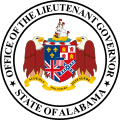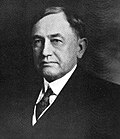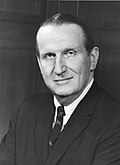Lieutenant Governor of Alabama
Second-highest elected office in Alabama From Wikipedia, the free encyclopedia
The lieutenant governor of Alabama is the president of the Alabama Senate, elected to serve a four-year term. The office was created in 1868,[1] abolished in 1875,[2] and recreated in 1901.[3] According to the current constitution, should the governor be out of the state for more than 20 days, the lieutenant governor becomes acting governor, and if the governor dies, resigns or is removed from office (via impeachment), the lieutenant governor ascends to the governorship.[4] Earlier constitutions said the powers of the governor devolved upon the successor, rather than them necessarily becoming governor,[5] but the official listing includes these as full governors.[6] The governor and lieutenant governor are not elected on the same ticket.
| Lieutenant Governor of Alabama | |
|---|---|
 | |
| Government of Alabama | |
| Style | The Honorable |
| Term length | Four years, renewable once consecutively |
| Inaugural holder | Andrew J. Applegate |
| Formation | 1868 |
| Succession | First |
| Salary | $68,556 |
| Website | ltgov |
History
In 1868, the state of Alabama issued a constitution which provided for the office of lieutenant governor. The document prescribed that the officer was to serve as the president of the State Senate and cast tie-breaking votes in that body, and made them first in line of succession to the governor's office.[7] Andrew J. Applegate was the first person to serve as lieutenant governor.[8] In 1875, conservative Democrats determined the content of a new constitution which abolished the office in an attempt to reduce the size of state government. Alabama convened another constitutional convention in 1901. During its session, the incumbent governor died. Partly motivated by the lack of a clearly delineated line of gubernatorial succession, the delegates reestablished the office of lieutenant governor with responsibilities similar to those it previously held. Its constitutional responsibilities have been little altered since.[7]
Since the office's inception, 31 people have served as lieutenant governor of Alabama. Of those, only two have served two terms or more. The first woman to hold the office, Lucy Baxley, served from 2003 to 2007.[7]
Duties, powers, and structure
The lieutenant governor serves as president of the State Senate and assumes the office of governor in the event the gubernatorial office becomes vacant.[9] Senate rules empower the lieutenant governor to determine the composition of Senate committees and refer bills to committees of their choosing. As a result, the lieutenant governor typically exercises significant influence over the progress of legislation in the body.[7]
The state constitution does not provide any remedy in the event the lieutenant governor's office becomes vacant.[7] In such an instance, their role as the presiding officer of the State Senate is assumed by the Senate president pro tempore.[10]
List
| No. | Lieutenant Governor | Term in office | Party | Election | Governor[a] | |||
|---|---|---|---|---|---|---|---|---|
| 1 |  |
Andrew J. Applegate (1833–1870) [11] |
July 13, 1868[12] – August 21, 1870 (died in office) |
Republican[13] | 1868 | William Hugh Smith | ||
| — | Vacant | August 21, 1870 – November 26, 1870 |
Office vacated by death | |||||
| 2 |  |
Edward H. Moren (1825–1886) [14] |
November 26, 1870[15] – November 25, 1872 (lost election)[16] |
Democratic[17] | 1870 | Robert B. Lindsay | ||
| 3 |  |
Alexander McKinstry (1822–1879) [18] |
November 25, 1872[19] – November 24, 1874 (lost election)[20] |
Republican[21] | 1872 | David P. Lewis | ||
| 4 |  |
Robert F. Ligon (1823–1901) [22] |
November 24, 1874[23] – November 27, 1876 (office abolished) |
Democratic[24] | 1874 | George S. Houston | ||
| Office did not exist from November 28, 1876, to January 19, 1903 | ||||||||
| 5 |  |
Russell McWhortor Cunningham (1855–1921) [25] |
January 19, 1903[26] – January 14, 1907 (term-limited) |
Democratic[27] | 1902 | William D. Jelks[b] | ||
| 6 |  |
Henry B. Gray (1867–1919) [29] |
January 14, 1907[30] – January 16, 1911 (term-limited) |
Democratic[31] | 1906 | B. B. Comer | ||
| 7 |  |
Walter D. Seed Sr. (1864–1959) [32] |
January 17, 1911[c] – January 18, 1915 (term-limited) |
Democratic[36] | 1910 | Emmet O'Neal | ||
| 8 |  |
Thomas Kilby (1865–1943) [37][38][39] |
January 19, 1915[40][c] – January 20, 1919 (term-limited) |
Democratic[41] | 1914 | Charles Henderson | ||
| 9 |  |
Nathan Lee Miller (1866–1933) [42] |
January 21, 1919[43][c] – January 15, 1923 (term-limited) |
Democratic[44] | 1918 | Thomas Kilby | ||
| 10 |  |
Charles S. McDowell (1871–1943) [45] |
January 16, 1923[46][c] – January 17, 1927 (term-limited) |
Democratic[47] | 1922 | William W. Brandon[d] | ||
| 11 |  |
William C. Davis (1867–1934) [48] |
January 18, 1927[49][c] – January 19, 1931 (term-limited) |
Democratic[50] | 1926 | Bibb Graves | ||
| 12 |  |
Hugh Davis Merrill (1877–1954) [51] |
January 20, 1931[52][c] – January 14, 1935 (term-limited) |
Democratic[53] | 1930 | Benjamin M. Miller | ||
| 13 |  |
Thomas E. Knight (1898–1937) [54] |
January 15, 1935[55][c] – May 17, 1937 (died in office) |
Democratic[56] | 1934 | Bibb Graves | ||
| — | Vacant | May 17, 1937 – January 16, 1939 |
Office vacated by death | |||||
| 14 |  |
Albert A. Carmichael (1895–1952) [57] |
January 17, 1939[58][c] – January 18, 1943 (term-limited) |
Democratic[59] | 1938 | Frank M. Dixon | ||
| 15 |  |
Leven H. Ellis (1881–1968) [60] |
January 19, 1943[61][c] – January 20, 1947 (term-limited) |
Democratic[62] | 1942 | Chauncey Sparks | ||
| 16 |  |
James C. Inzer (1887–1967) [63] |
January 21, 1947[64][c] – January 15, 1951 (term-limited) |
Democratic[65] | 1946 | Jim Folsom | ||
| 17 |  |
James Allen (1912–1978) [66] |
January 16, 1951[67][c] – January 17, 1955 (term-limited) |
Democratic[68] | 1950 | Gordon Persons | ||
| 18 |  |
William G. Hardwick (1910–1993) [69] |
January 18, 1955[70][c] – January 19, 1959 (term-limited) |
Democratic[71] | 1954 | Jim Folsom | ||
| 19 |  |
Albert Boutwell (1904–1978) [72] |
January 20, 1959[73][c] – January 14, 1963 (term-limited) |
Democratic[74] | 1958 | John M. Patterson | ||
| 20 |  |
James Allen (1912–1978) [66] |
January 15, 1963[75][c] – January 16, 1967 (term-limited) |
Democratic[76] | 1962 | George Wallace | ||
| 21 |  |
Albert Brewer (1928–2017) [77][78][79] |
January 17, 1967[80][c] – May 7, 1968 (succeeded to governor) |
Democratic[81] | 1966 | Lurleen Wallace[e] (died May 7, 1968) | ||
| — | Vacant | May 7, 1968 – January 18, 1971 |
Office vacated by succession to governor |
Albert Brewer | ||||
| 22 |  |
Jere Beasley (b. 1935) [83][84] |
January 19, 1971[85][c] – January 15, 1979 (term-limited) |
Democratic[86] | 1970 | George Wallace[f] | ||
| 1974 | ||||||||
| 23 |  |
George McMillan (1943–2025) [87] |
January 16, 1979[88][c] – January 17, 1983 (did not run)[g] |
Democratic[89] | 1978 | Fob James | ||
| 24 |  |
Bill Baxley (b. 1941) [90] |
January 18, 1983[91][c] – January 19, 1987 (did not run)[h] |
Democratic[92] | 1982 | George Wallace | ||
| 25 |  |
Jim Folsom Jr. (b. 1949) [93][94] |
January 20, 1987[95][c] – April 22, 1993 (succeeded to governor) |
Democratic[96] | 1986 | H. Guy Hunt[i] (removed April 22, 1993) | ||
| 1990[97] | ||||||||
| — | Vacant | April 22, 1993 – January 16, 1995 |
Office vacated by succession to governor |
Jim Folsom Jr. | ||||
| 26 |  |
Don Siegelman (b. 1946) [98][99] |
January 17, 1995[100][c] – January 18, 1999 (elected governor) |
Democratic[101] | 1994 | Fob James[i] | ||
| 27 |  |
Steve Windom (b. 1949) [102] |
January 19, 1999[103][c] – January 20, 2003 (did not run)[j] |
Republican[104] | 1998 | Don Siegelman[k] | ||
| 28 |  |
Lucy Baxley (1937–2016) [105] |
January 21, 2003[106][c] – January 15, 2007 (did not run)[l] |
Democratic[107] | 2002 | Bob Riley[i] | ||
| 29 |  |
Jim Folsom Jr. (b. 1949) [93][94] |
January 16, 2007[108][c] – January 17, 2011 (lost election) |
Democratic[109] | 2006 | |||
| 30 |  |
Kay Ivey (b. 1944) [110][111] |
January 18, 2011[112][c] – April 10, 2017 (succeeded to governor) |
Republican[113] | 2010 | Robert J. Bentley (resigned April 10, 2017) | ||
| 2014 | ||||||||
| — | Vacant | April 10, 2017 – January 14, 2019 |
Office vacated by succession to governor |
Kay Ivey | ||||
| 31 |  |
Will Ainsworth (b. 1981) |
January 15, 2019[114][c] – Incumbent[m] |
Republican[115] | 2018 | |||
| 2022 | ||||||||
See also
Notes
- Cunningham acted as governor from April 25, 1904, to March 5, 1905, while Jelks was absent from the state.[28]
- The constitutional start date for 1911 was January 16, and that is when Governor Emmet O'Neal and Lieutenant Governor Walter D. Seed Sr. were sworn in.[33] However, the Alabama Supreme Court ruled in the case of Oberhaus v. State ex rel. McNamara that, regardless of when the swearing in took place, B. B. Comer's gubernatorial term did not end until the end of Monday, and O'Neal's term did not begin until the first minute of the next day.[34] This precedent appears to have quietly continued, as coverage of Robert J. Bentley's inauguration in 2011 noted he would not officially take office until midnight.[35] As lieutenant governors are elected to the same term as governor, lieutenant governors since 1911 that served to the end of their term are noted as leaving office on Monday, and their successor taking office on Tuesday.
- McDowell acted as governor from July 10, 1924, to July 11, 1924, while Brandon was absent from the state.[6]
- Beasley acted as governor from June 5, 1972, to July 7, 1972, while Wallace was absent from the state.[6]
- McMillan instead ran unsuccessfully for the Democratic nomination for governor.
- Baxley instead ran unsuccessfully for the Democratic nomination for governor.
- Represented the Republican Party
- Windom instead ran unsuccessfully for the Republican nomination for governor.
- Represented the Democratic Party
- Baxley instead ran unsuccessfully for governor.
- Ainsworth's second term began on January 17, 2023, and will expire January 18, 2027; he will be term-limited.
References
Wikiwand - on
Seamless Wikipedia browsing. On steroids.

